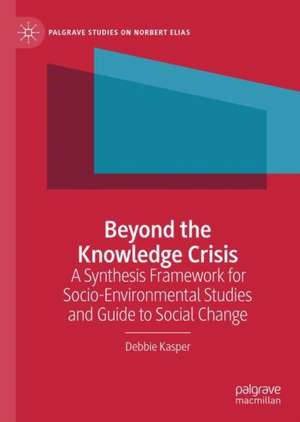Beyond the Knowledge Crisis: A Synthesis Framework for Socio-Environmental Studies and Guide to Social Change: Palgrave Studies on Norbert Elias
Autor Debbie Kasperen Limba Engleză Hardback – 4 noi 2020
| Toate formatele și edițiile | Preț | Express |
|---|---|---|
| Paperback (1) | 694.87 lei 6-8 săpt. | |
| Springer International Publishing – 5 noi 2021 | 694.87 lei 6-8 săpt. | |
| Hardback (1) | 495.87 lei 3-5 săpt. | +27.80 lei 7-13 zile |
| Springer International Publishing – 4 noi 2020 | 495.87 lei 3-5 săpt. | +27.80 lei 7-13 zile |
Preț: 495.87 lei
Nou
Puncte Express: 744
Preț estimativ în valută:
94.89€ • 101.46$ • 79.11£
94.89€ • 101.46$ • 79.11£
Carte disponibilă
Livrare economică 27 martie-10 aprilie
Livrare express 13-19 martie pentru 37.79 lei
Preluare comenzi: 021 569.72.76
Specificații
ISBN-13: 9783030483692
ISBN-10: 303048369X
Pagini: 334
Ilustrații: XXX, 273 p. 44 illus., 15 illus. in color.
Dimensiuni: 148 x 210 x 22 mm
Greutate: 0.51 kg
Ediția:1st ed. 2021
Editura: Springer International Publishing
Colecția Palgrave Macmillan
Seria Palgrave Studies on Norbert Elias
Locul publicării:Cham, Switzerland
ISBN-10: 303048369X
Pagini: 334
Ilustrații: XXX, 273 p. 44 illus., 15 illus. in color.
Dimensiuni: 148 x 210 x 22 mm
Greutate: 0.51 kg
Ediția:1st ed. 2021
Editura: Springer International Publishing
Colecția Palgrave Macmillan
Seria Palgrave Studies on Norbert Elias
Locul publicării:Cham, Switzerland
Cuprins
Introduction.- Chapter 1: The Crisis of the Librarian.- Chapter 2: Moving Toward Synthesis.- Chapter 3: A Science of Human Social Life? Present State, Future Prospects .- Chapter 4: Mapping the Territory.- Chapter 5: The Medium of Human Social Life.- Chapter 6: The Human Condition.- Chapter 7: Second Nature.- Chapter 8: Actions and Reactions.- Chapter 9: The Only Constant.- Conclusion: Insights, Applications, and Possibilities.
Notă biografică
Debbie V.S. Kasper is a sociologist and Associate Professor of Environmental Studies at Hiram
College, in northeast Ohio. She specializes in sociological theory, environmental sociology,
community resilience, and social change and teaches a wide variety of courses related to these
themes.
Textul de pe ultima copertă
“Although not about Norbert Elias, Beyond the Knowledge Crisis is very much in Eliasian spirit. Broad in sweep, Kasper’s book examines the ecological crisis—the practical issue of politics and policy now and in the near future. The author’s stress throughout is on the word synthesis, recognizing that a theoretical and empirical intellectual synthesis of history and the social and natural sciences is necessary to tackle the global problems of the age. This very synthesis is that which Elias himself was seeking to achieve, especially in his late writings.”
—Stephen Mennell, Professor Emeritus of Sociology, University College Dublin, Ireland
—Stephen Mennell, Professor Emeritus of Sociology, University College Dublin, Ireland
In the face of complex, interwoven, planet-scale problems, many cite the need for more integrated knowledge—especially across the natural and social sciences. Excessive specialization, they argue, gets in the way of knowing what we know, much less being able to use it to address urgent socio-environmental crises. These concerns, it turns out, go back centuries. This book picks up where most leave off, exploring the history of how we got here and proposing a way forward. Along the way, readers find that the synthesis long called for depends on theoretical advancements in social science. Fortunately, the author argues, we have everything we need to achieve those advancements, thanks largely to the contributions of Norbert Elias. Integrating his insights with history, science, sociological theory, and more, this book neatly packages the upgraded paradigm we need to be able to meaningfully address complex socio-environmental problems and more intentionally shape humanity’s collective future.
Caracteristici
Assembles existing knowledge in the environmental and social sciences to generate a science-based, integrated, accessible, and actionable theoretical framework for socio-environmental studies Overcomes dualistic tendencies in conventional worldviews, such as humans and nature, individual and society, and the like Facilitates interdisciplinary communication and collaboration among those seeking to understand and address complex socio-environmental issues Outlines a general theory of social change







